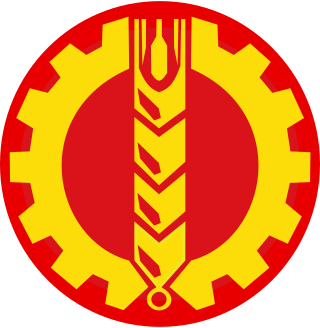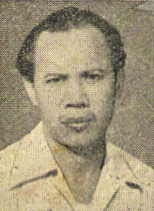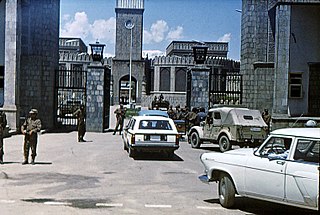Related Research Articles

The Democratic Republic of Afghanistan (DRA), renamed the Republic of Afghanistan in 1987, was the Afghan state during the one-party rule of the People's Democratic Party of Afghanistan (PDPA) from 1978 to 1992. It relied heavily on assistance from the Soviet Union for most of its existence, especially during the Soviet–Afghan War.

Mohammad Daoud Khan was an Afghan military officer and politician who served as prime minister of Afghanistan from 1953 to 1963 and, as leader of the 1973 Afghan coup d'état which overthrew the monarchy, served as the first president of Afghanistan from 1973 until his assassination in the Saur Revolution.

The Soviet–Afghan War was a protracted armed conflict fought in the Soviet-controlled Democratic Republic of Afghanistan (DRA) from 1979 to 1989. The war was a major conflict of the Cold War as it saw extensive fighting between the DRA, the Soviet Union and allied paramilitary groups against the Afghan mujahideen and their allied foreign fighters. While the mujahideen were backed by various countries and organizations, the majority of their support came from Pakistan, the United States, the United Kingdom, China, Iran, and the Arab states of the Persian Gulf. The involvement of the foreign powers made the war a proxy war between the United States and the Soviet Union. Combat took place throughout the 1980s, mostly in the Afghan countryside. The war resulted in the deaths of approximately 3,000,000 Afghans, while millions more fled from the country as refugees; most externally displaced Afghans sought refuge in Pakistan and in Iran. Approximately 6.5% to 11.5% of Afghanistan's erstwhile population of 13.5 million people is estimated to have been killed over the course of the conflict. The Soviet–Afghan War caused grave destruction throughout Afghanistan and has also been cited by scholars as a significant factor that contributed to the dissolution of the Soviet Union, formally ending the Cold War.

The People's Democratic Party of Afghanistan (PDPA) was a Marxist–Leninist political party in Afghanistan established on 1 January 1965. Four members of the party won seats in the 1965 Afghan parliamentary election, reduced to two seats in 1969, albeit both before parties were fully legal. For most of its existence, the party was split between the hardline Khalq and moderate Parcham factions, each of which claimed to represent the "true" PDPA.

The 1953 Iranian coup d'état, known in Iran as the 28 Mordad coup d'état, was the U.S.- and British-instigated, Iranian army-led overthrow of the elected Prime Minister Mohammad Mosaddegh in favor of strengthening the monarchical rule of the shah, Mohammad Reza Pahlavi, on 19 August 1953, with one of the significant objectives being to protect British oil interests in Iran. It was aided by the United States and the United Kingdom.

Pan-Islamism is a political movement which advocates the unity of Muslims under one Islamic country or state – often a caliphate – or an international organization with Islamic principles. Historically, after Ottomanism, which aimed at the unity of all Ottoman citizens, Pan-Islamism was promoted in the Ottoman Empire during the last quarter of 19th century by Sultan Abdul Hamid II for the purpose to prevent secession movements of the Muslim peoples in the empire.

Gaafar Muhammad an-Nimeiry was a Sudanese military officer and politician who served as the fourth head of state of Sudan from 1969 to 1985, first as Chairman of the National Revolutionary Command Council and then as President.

The Ministry of Defense is the cabinet ministry of Afghanistan responsible for overseeing the military of Afghanistan. The ministry is located in Kabul.

Jamayat-E-Islami, sometimes shortened to Jamiat, is a predominantly Tajik political party and former paramilitary organisation in Afghanistan. It is the oldest and largest functioning political party in Afghanistan, and was originally formed as a student political society at Kabul University. It has a communitarian ideology based on Islamic law. During the Soviet–Afghan War and the following Afghan Civil War against the communist government, Jamiat-e Islami was one of the most powerful of the Afghan mujahideen groups. Burhanuddin Rabbani led the party from 1968 to 2011, and served as President of the Islamic State of Afghanistan from 1992 to 2001, in exile from 1996.

Muhammad Hatta Lukman was an Indonesian communist politician, who served as the First Deputy Chairman of the Central Committee of the Communist Party of Indonesia (PKI), and a member of the People's Representative Council from 1956 until 1959. He was executed following the 1965 crackdown on the PKI.

The Saur Revolution or Sowr Revolution, also known as the April Revolution or the April Coup, was staged on 27–28 April 1978 by the People's Democratic Party of Afghanistan (PDPA) and overthrew Afghan president Mohammed Daoud Khan, who had himself taken power in the 1973 Afghan coup d'état and established an autocratic one-party system in the country. Daoud and most of his family were executed at the Arg in the capital city of Kabul by Khalqi military officers, after which his supporters were also purged and killed. The successful PDPA uprising resulted in the creation of a socialist Afghan government that was closely aligned with the Soviet Union, with Nur Muhammad Taraki serving as the PDPA's General Secretary of the Revolutionary Council. Saur or Sowr is the Dari-language name for the second month of the Solar Hijri calendar, during which the events took place.

The Afghan mujahideen (Pashto: افغان مجاهدين) were Islamist resistance groups that fought the Democratic Republic of Afghanistan and the Soviet Union during the Soviet–Afghan War and the subsequent First Afghan Civil War.

Ba'athist Iraq, officially the Iraqi Republic (1968–1992) and later the Republic of Iraq (1992–2003), was the Iraqi state between 1968 and 2003 under the rule of the Arab Socialist Ba'ath Party. This period began with high economic growth, but ended with the country facing severe levels of socio-political isolation and economic stagnation. By the late 1990s, the average annual income had decreased drastically due to a combination of external and internal factors. UNSC sanctions against Iraq, in particular, were widely criticized for negatively impacting the country's quality of life, prompting the establishment of the Oil-for-Food Programme. The Ba'athist period formally came to an end with the 2003 invasion of Iraq, and the Ba'ath Party has since been indefinitely banned across the country.
The Arab Cold War was a political rivalry in the Arab world from the early 1950s to the late 1970s and a part of the wider Cold War. It is generally accepted that the beginning of the Arab Cold War is marked by the Egyptian revolution of 1952, which led to Gamal Abdel Nasser becoming president of Egypt in 1956. Thereafter, newly formed Arab republics, inspired by revolutionary secular nationalism and Nasser's Egypt, engaged in political rivalries with conservative traditionalist Arab monarchies, influenced by Saudi Arabia. The Iranian Revolution of 1979, and the ascension of Ayatollah Ruhollah Khomeini as leader of Iran, is widely seen as the end of this period of internal conflicts and rivalry. A new era of Arab-Iranian tensions followed, overshadowing the bitterness of intra-Arab strife.

The Republic of Afghanistan was the first republic in Afghanistan. It is often called the Daoud Republic, as it was established in July 1973 after General Sardar Mohammad Daoud Khan of the Barakzai dynasty alongside senior Barakzai Princes deposed his cousin, King Mohammad Zahir Shah, in a coup d'état. The occcasion for the coup was the 1964 Constitution of Afghanistan, that took power from most members of the royal family, in favour of the centralization under Zahir Shah and his offspring under the tenet of democracy. Daoud Khan was known for his autocracy and attempts to modernize the country with help from both the Soviet Union and the United States, among others.
As a geographically fragmented state, Afghanistan is separated into as many as 14 ethnic groups that have historically faced divisions that devolved into political violence. This conflict reached its culminating point in the 1990s with the rise of the Taliban.

The 1973 Afghan coup d'état, also called by Afghans as the Coup of 26 Saratan and self-proclaimed as the Revolution of 26 Saratan 1352, was led by Army General and prince Mohammad Daoud Khan against his cousin, King Mohammad Zahir Shah, on 17 July 1973, which resulted in the establishment of the Republic of Afghanistan under a one-party system led by Daoud Khan.
Several coup d'etats or similar events have occurred in Afghanistan since its modern foundation in 1919.
The 1975 Panjshir Valley uprising was an Islamist uprising led by Jamiat-e Islami against the government of Daoud Khan, and was the first ever ISI operation that took place in Afghanistan. It was in "retaliation to Republic of Afghanistan’s proxy war and support to the militants against Pakistan".
The 1976 Afghan coup d'état attempt was a coup attempted in the Republic of Afghanistan against the government of President Mohammed Daoud Khan by the Qiyam-i Islami, an Islamist group formed largely of Afghan Army personnel. The coup was preempted; General Mir Ahmad Shah Rizwani and 50 of his associates were arrested on 9 December 1976, and Rizwani executed in 1978 following the communist takeover.
References
- ↑ Bahaudin Ghulam Mujtaba (December 2006). Afghanistan: Realities of War and Rebuilding. Ilead Academy. p. 38. ISBN 978-0-9774211-1-4.
- ↑ Barry M. Rubin (2010). Guide to Islamist Movements. M.E. Sharpe. pp. 181–. ISBN 978-0-7656-4138-0.
- ↑ Hafizullah Emadi (14 September 2010). Dynamics of Political Development in Afghanistan: The British, Russian, and American Invasions. Palgrave Macmillan. pp. 134–. ISBN 978-0-230-11200-1.